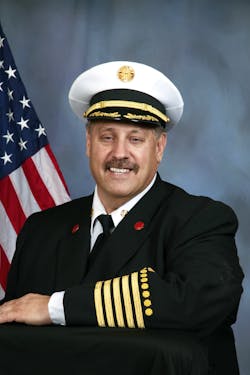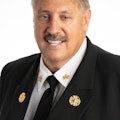You and your ambulance are dispatched to a nursing home in your first-due area for a “sick call—nothing further.” When you arrive at the nursing home, you take your stretcher and equipment inside with you. You go to the nurse’s station on the second floor and are greeted by someone in a white uniform who tells you to go to Room 243, Bed 2. “Someone will be waiting for you,” she says. You go to Room 243, but no one is there other than a little old lady who appears to be in her 80s and who is very thin.
She is laying in the bed, conscious and alert, but does not say anything. The room is drab with just one nightstand next to the bed. The smell of dried urine permeates the room. There is no evidence of food or water. You check the patient’s skin turgor, and there is no elasticity. There is also an increased capillary refill time.
You wait for about 10 minutes and finally decide to go looking for someone. Your partner remains with the patient. When you get back to the nurse’s station, no one is there. You start searching and eventually find one lone nurse’s aide in a room some distance from the nurse’s station. When you question the nurse’s aide about the patient in Room 243, she lets know she’ll get to you as soon as she is done with her current patient.
You wait for her outside the room, and when she is done, she just tells you to take the patient to the hospital. When you try to find out what is wrong, she says all she knows is that the doctor who comes once a week wants her taken to the hospital because she often appears ill. She returns to the nurse’s station with you and gives you some paperwork with the patient’s name and other vital information.
You then return to the patient’s room and share the information with your partner. Your partner then tells you, “I don’t think this lady has anybody really taking care of her. She is dehydrated and somewhat emaciated.”
This could be classified as elder abuse.
Identifying abuse
Elder abuse can be neglect, financial exploitation, or physical, sexual or psychological abuse. Elder abuse can take place in any type of living facility, including the home, assisted-living facilities and nursing homes.
In many cases, when the abuse involves neglect, it is because the caretaker is unable to physically take care of the person, such as an elderly person trying to take care of their elderly spouse in the home; it could also happen at a nursing home that is inadequately staffed. Neglect constitutes not taking care of the patient’s needs, such as personal hygiene, food, water or clothing. Unfortunately, neglect can lead to other medical complications, such as bed sores, skin infections, dehydration and malnutrition.
Firefighters who run medical calls are in a unique position to identify elder abuse. Some things they should be looking for include burns, skin bruising of different colors, dehydration, evidence of alcohol in the residence, and a household in disarray.
Firefighters who encounter caretakers who are defensive, fail to answer questions properly, or appear to be hiding something should take note of the suspicious behavior and be on alert for evidence of abuse. Another sign that something is wrong is being repeatedly dispatched to the same address for the same patient who has physical injuries.
In most states, people who suspect elder abuse are required to report it. Check with your state requirements, but sometimes reporting it to the emergency department staff qualifies as reporting. Before you report anything, check with the officer to whom you report to make sure they are in the loop, and that you are following the proper chain of command before you reach out to an agency outside your department.
Patient advocate
Firefighters are in good position to be a patient advocate when it comes to the elderly who are being abused. Care should be exercised that you are not making false accusations, but at the time same time, you should be a champion for the patient and make sure they are receiving the proper care.
About the Author
Gary Ludwig
GARY LUDWIG has served in three fire departments over his career: St. Louis, Memphis, and Champaign, IL. His fire, EMS and rescue career spanned a total of 46 years, and he has been a paramedic for over 44 years. Ludwig served as president of the International Association of Fire Chiefs in 2019-20. He has a Master’s degree in Business and Management, has written over 500 articles for professional fire and EMS publications and is the author of seven books.
Connect with Gary
Email: [email protected]
Facebook: Gary Ludwig
Twitter: @ChiefGaryLudwig
Website: garyludwig.com

